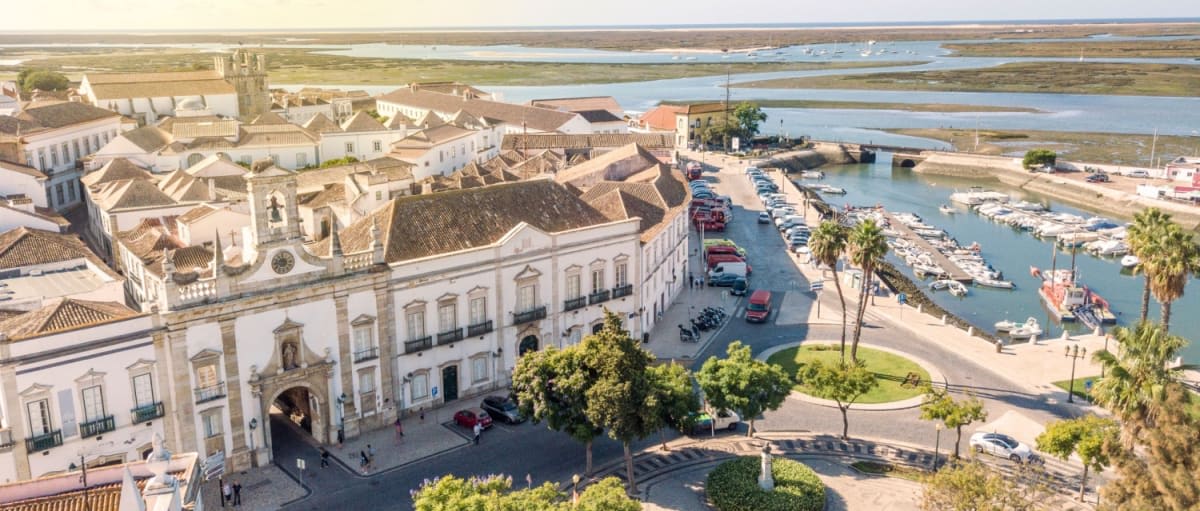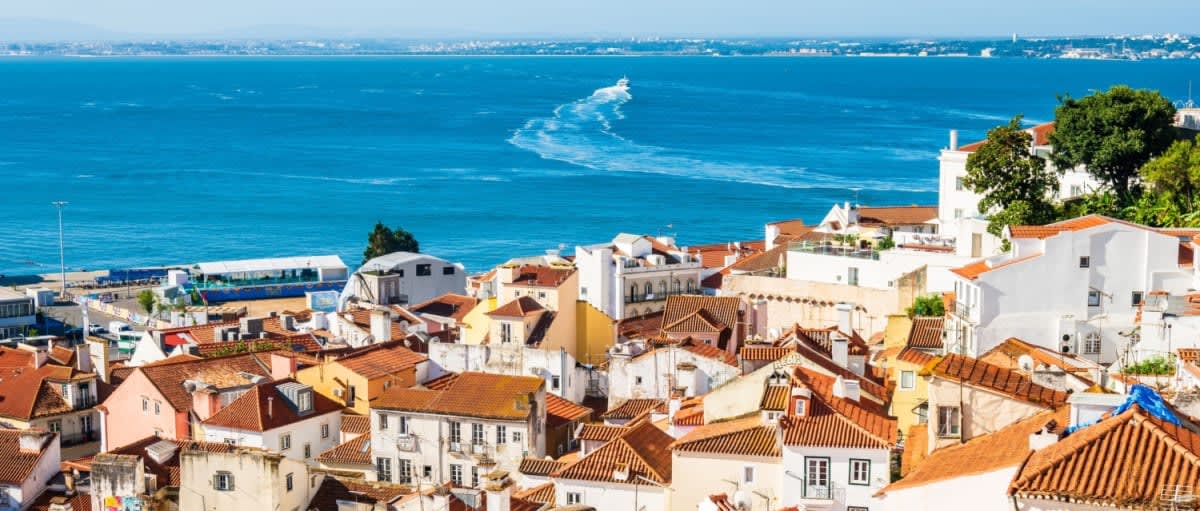Buying property in Portugal is a rewarding step for many international buyers, whether you’re looking for a second home, planning for retirement or relocating permanently. However, understanding the tax obligations involved is essential before making an offer. Therefore, you need to learn about Portuguese property taxes.
Portugal has a relatively straightforward property tax system, but the amounts you owe will vary depending on the value of the property, its location and whether you plan to live in it or rent it out. Additionally, becoming a tax resident in Portugal changes how your global income is assessed.
Below you’ll find a clear breakdown of the key taxes you need to understand when purchasing or owning a property in Portugal. It’s suitable for buyers in 2025 and includes the latest available figures. For tailored advice, it’s best to speak with an independent tax adviser familiar with both Portuguese law and the tax rules in your home country.
Download the Portugal Buying Guide
Contents

Taxes when buying a property in Portugal
When you buy a home in Portugal, you’ll need to pay a property transfer tax known as Imposto Municipal sobre a Transmissão Onerosa de Imóveis (IMT). This tax applies whether you’re purchasing a permanent home, second residence or rental property.
IMT is a tiered tax based on the greater of either the property’s purchase price or its rateable value as assessed by the municipal council. For residential property, the tax thresholds currently range from 1% to 8%, depending on value. Primary residences benefit from discounted rates.
There is full IMT exemption for main homes valued at under €92,407. Tax increases progressively for more valuable properties, with the sharpest jumps occurring at price thresholds like €126,403 and €172,348. Purchases of agricultural land or rural properties have a flat rate of 5%.
Several exemptions apply. Properties in urban regeneration areas, homes of low taxable value and buyers over the age of 65 acquiring a permanent home may qualify for relief or total exemption.
You’ll pay this tax before final paperwork is signed, usually as part of your closing costs. The notaire or solicitor handling the transaction will calculate and confirm the amount due. Failing to pay before completion may result in fines or delays.
For a closer look at the purchase process, claim your free copy of our Portugal Buying Guide:
Download the Portugal Buying Guide
Stamp duty in Portugal
Portugal also charges Imposto do Selo, or stamp duty, when certain legal documents are formalised – including deeds of property transfer. For buyers, this cost is modest but unavoidable.
Stamp duty is charged at a standard rate of 0.8% of the purchase price and is usually paid on the day you sign the deeds or shortly after. If you’re being issued a mortgage, the loan contract will trigger an additional charge of 0.6% on the mortgage amount.
It’s important to budget for stamp duty alongside IMT. It cannot be incorporated into the purchase price or deferred. If you are buying via a company or don’t yet have a Número de Identificação Fiscal (NIF) – Portugal’s tax ID – the rate can rise to 1%.
There may be regional variations to the way stamp duty is applied or calculated, particularly for commercial or rural properties. Your lawyer or notaire will take responsibility for ensuring compliance but always ask for a breakdown of these charges in your contract summary.
VAT on new builds
If you’re purchasing a newly built property directly from a developer, then Value Added Tax (VAT), or Imposto sobre o Valor Acrescentado (IVA), may apply. This is instead of the standard IMT property transfer tax.
For residential property, VAT is normally charged at 23%, which is the standard rate in mainland Portugal. This should be clearly included in the advertised purchase price but buyers are advised to confirm with the developer or estate agent.
This VAT tax only applies to brand-new homes sold by professional developers or construction firms. If you’re buying a resale property or purchasing privately, VAT will not apply and you’ll pay IMT instead.
Purchasers should be vigilant about uncommonly low list prices on new builds, as these may not include VAT up front. If you sign a contract based on the net price and VAT is later added, it could significantly increase your final bill. Ask the developer to clarify this before signing a Promessa de Compra e Venda (promissory contract).
Ongoing Portuguese property taxes
After purchase, Portuguese homeowners must pay Imposto Municipal sobre Imóveis (IMI), an annual local property tax. It is similar to council tax in the UK and is paid to the local câmara municipal.
IMI rates depend on location and property type. For urban homes, the rate usually falls between 0.3% and 0.45% of the property’s tax value (not market value). Rural land is charged at a flat 0.8%. Municipal authorities set the final rate, so two neighbouring homes might be charged differently.
The tax value is reassessed every few years and is usually lower than market value, which keeps IMI fairly reasonable for most owners. You’ll receive a notification once a year (normally in April or May) that outlines your payment options – either in a single payment or split across three instalments.
Certain properties may be temporarily exempt – for example, newly-built main residences can qualify for a three-year IMI exemption. Seniors buying a permanent home and lower-value properties may also be exempt, depending on total family income and property usage.
Income tax and rental income
If you rent out your home in Portugal – even for just part of the year – you must report rental income through a Portuguese tax return. The income is subject to Imposto sobre o Rendimento das Pessoas Singulares (IRS), which covers personal income.
Non-residents are taxed at a flat rate of 28% on net rental income. Resident homeowners may be taxed progressively, depending on their total global income, falling between 14.5% and 48% as of the 2025 scale.
You can deduct some property-related expenses from your rental income, such as maintenance, management fees, insurance and local taxes – provided you keep all valid invoices. Always register any rental activity with the tax office to avoid penalties.
If you spend more than 183 days a year in Portugal, you become a tax resident and must declare global income here. Thanks to Portugal’s network of double taxation agreements – including with the UK, US and most EU countries – you won’t be taxed twice but may need to pay any difference between tax rates.
Portuguese wealth tax (AIMI)
Portugal’s Adicional ao IMI (AIMI) is a property-based wealth tax that applies to high-value real estate. It is based on the taxable value of your real estate portfolio, not your global assets or income.
You’ll pay AIMI if the combined Valor Patrimonial Tributário (VPT) of your properties exceeds €600,000 per individual. The VPT is usually lower than your property’s purchase price, offering a margin before you hit the threshold.
Rates as of 2025 are:
- 0.7% on holdings over €600,000
- 1% on holdings between €1 million and €2 million
- 1.5% on holdings above €2 million
If you own property jointly (e.g. as a couple), your joint exemption is €1.2 million. AIMI replaces the previous luxury property tax and is automatically calculated by Portuguese tax authorities each year in June.
AIMI is only charged on residential and buildable land. Commercial property and agricultural land is exempt. If you’re buying through a company or an SCI-type structure, different rules apply – seek advice to confirm your tax exposure.
Capital gains tax when selling a property
When you sell your Portuguese property, you may need to pay capital gains tax on the profit. This applies to both residents and non-residents.
For residents, capital gains are added to your income and taxed at progressive rates between 14.5% and 48%, although only 50% of the gain is taxable if the home is classed as your primary residence. If you reinvest all your proceeds in another permanent home within the EU or EEA within 36 months, you may qualify for exemption.
For non-residents from within the EU or EEA, the flat capital gains tax rate is 19%. For non-EU sellers – including British citizens post-Brexit – the fixed rate is higher at 28%, although this may be reduced by double tax treaties.
Allowable deductions include the cost of legal fees, transfer taxes, renovations and estate agent commissions. Keep all receipts from the time of purchase to avoid overpaying tax later.
Special rules also apply to properties inherited or gifted. If unsure, speak with a Portuguese accountant before you sell.
Start your Portuguese property taxes journey with expert advice
Understanding Portugal’s tax system is key to avoiding unpleasant surprises and ensuring your ownership remains cost-efficient. The right financial preparation today can save you thousands over the years.
Looking for personalised tax advice? Contact our team of trusted experts for guidance that suits your situation. You can also download our free Portugal Property Buying Guide.
Tax is just one part of the picture when buying a home abroad. If you’re still exploring where to buy property in Portugal, our regional breakdown helps you compare areas based on lifestyle, pricing and investment potential. And when you’re ready to proceed, our full guide on how to buy property in Portugal walks you through the entire purchase process – from budgeting to completion.
Frequently asked questions Portuguese property taxes
Property tax (IMI) ranges from 0.3% to 0.45% annually for urban homes, based on the property’s tax value. Rates vary by municipality and property type.
Yes. Non-residents pay a flat 28% tax on net rental income. Residents are taxed on a sliding scale from 14.5% to 48%, depending on overall income.
You’ll need to pay IMT (property transfer tax), stamp duty (0.8%), and possibly VAT if you’re buying a new build from a developer. These must be paid before completion.
IMI exemptions may apply for new builds, lower-value homes, or primary residences. IMT exemptions are available for properties below €92,407, depending on circumstances.
AIMI is Portugal’s additional property wealth tax, charged annually on the total value of Portuguese properties exceeding €600,000 (€1.2 million for couples).









